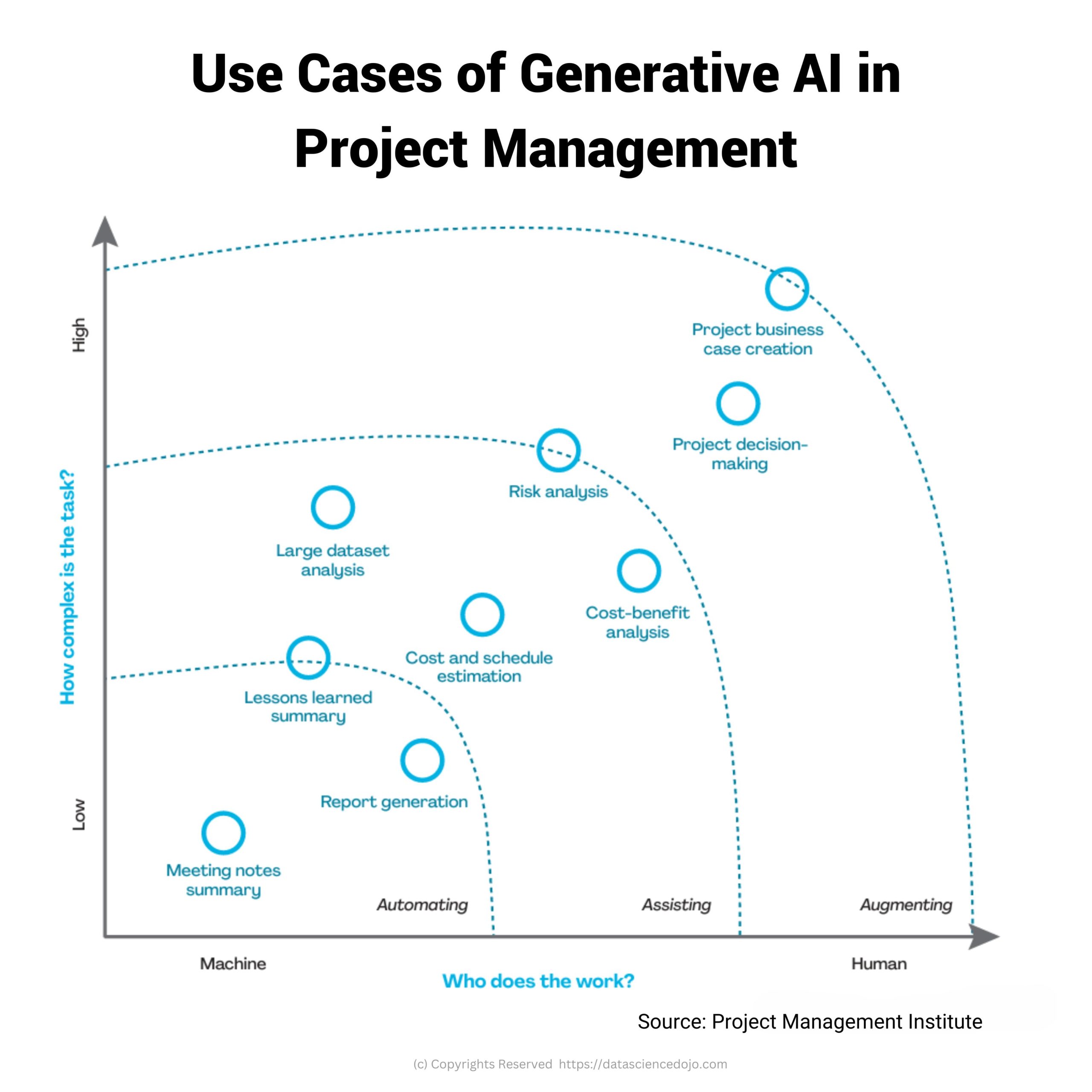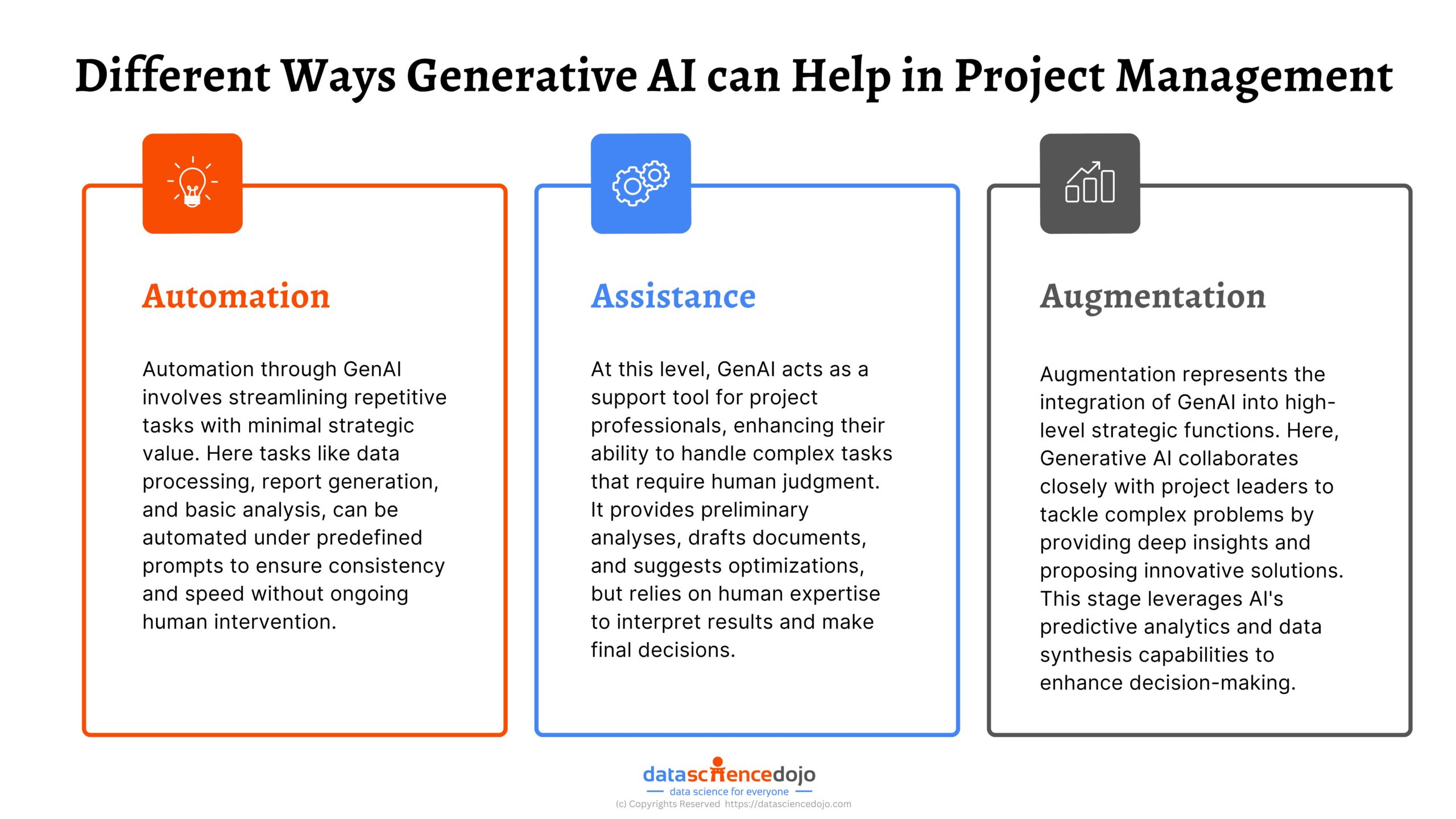With a broad spectrum of applications, AI is fast becoming a staple in project workflows. Recent findings from a Capterra survey underscore this trend, revealing that 93% of project managers saw a positive return on investment from AI tools last year, with only a minimal 8% of companies not yet planning to adopt AI technologies.
It is not a question of whether AI will help project managers achieve better results. The numbers are showing that it already has!
Now that artificial intelligence is equipped with generative capabilities, the potential for enhancing project management processes has expanded significantly, promising to revolutionize project outcomes and strategic planning by enhancing efficiency and decision-making capabilities.
In this blog, we will paint a clearer picture of how generative AI will change the current landscape of AI project management.
Learn How is Generative AI Reshaping the Future of Work?
The increasing need for AI project management
According to the latest PMI Annual Global Survey, the penetration of AI project management is not just theoretical but increasingly practical:
- 21% of survey respondents already utilize AI frequently in their project management practices, harnessing its power to streamline operations and enhance decision-making.
- A staggering 82% of senior leaders believe that AI will significantly impact project management strategies in their organizations, pointing towards a future where AI integration becomes the norm rather than the exception.
These statistics are a clear indicator of the growing reliance on AI in the project management sector, underscoring the need for professionals to adapt and innovate continuously.
As we delve deeper into the use cases of Generative AI, we’ll explore how these technologies are not just supporting but also enhancing the project management landscape.
Explore the Top 7 Generative AI courses offered online
Core use cases of generative AI in project management
To fully explore and leverage the potential of existing generative AI tools in project management, it’s crucial to evaluate project tasks and deliverables along two primary dimensions: task complexity and the degree of human intervention required.
The complexity of a task can range from low to high, influenced by factors such as the number of variables involved, the need for a nuanced business context, and specific project management expertise.
Concurrently, the degree of human intervention relates directly to the complexity, where more intricate tasks necessitate greater human oversight to achieve the desired outcomes.
This dual-dimensional approach helps categorize how GenAI can support project management into three core functionalities: automation, assistance, and augmentation. Each category is tailored to match the complexity and human intervention needed, ensuring that GenAI applications are both effective and contextually appropriate.

Automation
In tasks with low complexity and minimal need for human intervention, GenAI excels in automation, efficiently handling routine processes and updates. Automation use cases include:
Understand the potential of Generative AI and LLMs to empower non-profit organizations
- Generating status reports and financial summaries: GenAI tools automatically compile and generate comprehensive reports detailing project status and financial metrics, drawn from continuous data feeds without manual input.
- Auto-populating project management tools: By automating the entry of updates and task statuses in project management software, GenAI tools ensure that project tracking is consistently up-to-date, reducing the administrative burden on project teams.
- Scheduling and resource optimization: GenAI can optimize the scheduling of tasks and allocation of resources by analyzing project timelines and resource usage patterns, ensuring optimal project flow without direct human management.
- Automated quality control: In settings like manufacturing, AI tools can monitor product quality, detect defects, and manage waste, ensuring standards are met without constant human oversight.
Explore 12 must-have AI tools to revolutionize your daily routine
Assistance
For medium-complexity tasks where human oversight is still crucial but can be minimized through intelligent support, generative AI can provide useful assistance. This intermediate level includes:
- Drafting project documents: GenAI can produce initial drafts of essential documents like project plans, which project managers can then review and refine.
- Analyzing project risks: Utilizing historical data and predictive analytics, AI can identify patterns and trends that may pose future risks. By learning from past projects, it can forecast issues before they arise.
- Suggesting preventive measures: Once potential risks are identified, AI tools can recommend strategies to mitigate these risks based on successful approaches used in similar past scenarios. This proactive risk management helps in maintaining project timelines and budgets.
- Enhanced data analysis for market trends: Generative AI tools can analyze large datasets to extract market trends and customer insights, providing project managers with detailed reports that inform strategic decisions.
- Project health monitoring: By continuously analyzing project metrics against performance benchmarks, GenAI can alert managers to potential issues before they escalate, allowing for preemptive management actions.
Understand Top 8 AI Tools for Code Generation
Resource Allocation: GenAI analyzes performance data and project requirements to recommend resource distribution, optimizing team deployment and workload management.
Augmentation
In high-complexity scenarios where strategic decision-making integrates deep insights from vast data sets, GenAI augments human capabilities by enhancing analysis and foresight. Augmentation use cases involve:
- Enhancing scenario planning: Through predictive analytics, GenAI models various project scenarios, providing project managers with foresight and strategic options that anticipate future challenges and opportunities.
- Facilitating complex decision-making: GenAI integrates diverse data sources to deliver nuanced insights, aiding project managers in complex decision-making processes that require a comprehensive understanding of multiple project facets.
- Creating comprehensive business cases: Leveraging detailed data analysis, GenAI helps formulate robust business cases that encapsulate extensive market analysis, resource evaluations, and strategic alignments, designed for critical stakeholder review.
This structured approach to applying Generative AI in project management, based on task complexity and necessary human intervention, not only maximizes efficiency but also enhances the strategic impact of different projects.
Read more on AI-powered CRMs
Advantages of Implementing Generative AI in Project Management
Implementing AI project management brings quantifiable benefits across several key areas:
- Efficiency: GenAI significantly streamlines project workflows by automating routine tasks such as data entry, scheduling, and report generation. This automation reduces the time required to complete these tasks from hours to minutes, thereby accelerating project timelines and enabling teams to meet their goals faster.
- Cost reduction: By automating and optimizing various project tasks, GenAI helps in minimizing overhead costs. For instance, the use of AI in resource allocation can reduce underutilization and overallocation, which in turn decreases the financial strain caused by inefficient resource management.
- Improved accuracy: GenAI tools are equipped with advanced analytics capabilities that can process large datasets with high precision. This leads to more accurate forecasting, risk assessment, and decision-making, reducing the margin of error that can come from human oversight.
Furthermore, GenAI empowers project managers to focus on higher-level, creative, and strategic tasks. By handling the more monotonous or complex data-driven tasks, GenAI frees up human managers to engage in activities that require human intuition, such as stakeholder negotiations, strategic planning, and innovation management, enhancing their contribution to organizational goals.
Challenges and Considerations of generative AI in project management
While the advantages of GenAI are compelling, several challenges and ethical considerations need to be addressed to fully harness its potential:
- Data privacy concerns: As GenAI systems require access to vast amounts of data to learn and make predictions, there is an inherent risk related to data privacy and security. Ensuring that these systems comply with global data protection regulations (e.g., GDPR, HIPAA) is crucial.
- Need for robust training data: The effectiveness of a GenAI system is heavily dependent on the quality and quantity of the training data it receives. Gathering diverse, comprehensive, and unbiased training sets is essential but often challenging and resource-intensive.
- Managing the human-machine interface: Integrating GenAI tools into existing workflows can be complex, requiring adjustments in team dynamics and workflow processes. Ensuring that these tools are user-friendly and that staff are adequately trained to interact with them is essential for successful implementation.
Read more about the Risks of Generative AI
Ethical considerations
- Management of bias: AI systems can inadvertently learn and perpetuate biases present in their training data. It is vital to continually assess and correct these biases to prevent discriminatory practices.
- Ensuring transparency: AI-driven decisions in project management should be transparent and explainable. This transparency is crucial not only for trust but also for compliance with regulatory requirements.
Addressing these challenges and considerations thoughtfully will be key to successfully integrating GenAI into project management practices, ensuring that its deployment is both effective and responsible.
Upskilling for generative AI proficiency
As generative AI becomes increasingly integral to project management, the need for project managers to adapt and enhance their skills is crucial. To effectively leverage GenAI, project managers should focus on:
- Understanding AI fundamentals: Start with the basics of AI and machine learning, focusing on how these technologies can be applied to automate tasks, analyze data, and enhance decision-making in project management.
- Technical training: Engage in technical training that covers AI tools and platforms commonly used in project management. This includes learning how to interact with AI interfaces and understanding the backend mechanics to better integrate these tools with daily project activities.
- Strategic application: Learn the strategic application of Generative AI in project management by participating in workshops and case study sessions that explore successful AI integration projects.
Embracing a transformative future of AI in project management
AI project management is not just a trend but a transformative shift that enhances project efficiency, accuracy, and outcomes. As these technologies continue to evolve, they offer significant opportunities for project managers to improve traditional practices and drive success in increasingly complex project environments.
Project managers are encouraged to actively explore and integrate AI technologies into their practices. By embracing GenAI, they can enhance their project delivery capabilities, making them more competitive and effective in managing future challenges.
This journey requires continuous learning and adaptation, but the rewards—increased efficiency, more strategic insights, and enhanced decision-making—highlight its immense potential.



